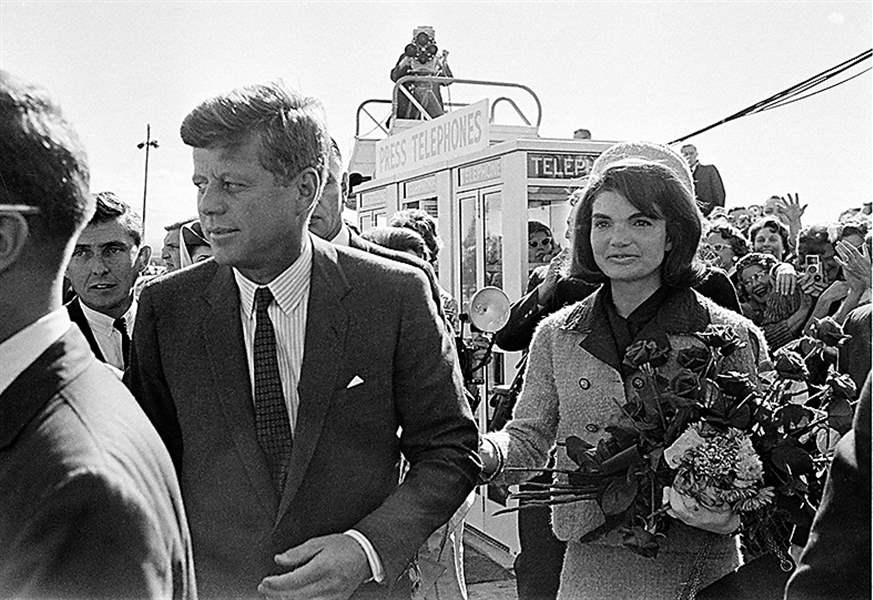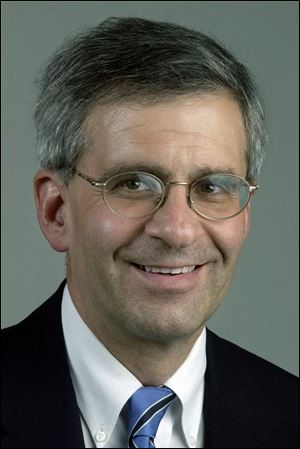
COMMENTARY
If Kennedy had lived, how would the 1960s have unfolded?
11/10/2013
President John F. Kennedy and his wife, Jacqueline Kennedy, arrive at Love Field airport in Dallas on Nov. 22, 1963.
ASSOCIATED PRESS

David M. Shribman.
The nation this month is preoccupied with memory: The shots in Dallas. The frantic drive to Parkland Hospital. The agonizing moments of uncertainty, followed by the lingering feeling of incredulity. The arrest and then the slaying of the accused killer. The coffin in the Capitol.
But it isn’t only memory that haunts us in the run-up to the 50th anniversary of the assassination of President John F. Kennedy. We are haunted almost as much by what might have been as by what happened.
What would have occurred in the remainder of the president’s term? In the 1964 election? In a second term, presuming Mr. Kennedy was re-elected?
This is more than a parlor game. It prompts us to examine how our history unfolded, whether there was an alternative course, whether the upheaval of the 1960s, the eventual election of Richard Nixon, even Watergate, might have been avoided had the bullets missed their mark.
Consider if the president had survived, had the day in Dallas dawned rainy and not brilliantly bright, prompting Mr. Kennedy to ride in a covered 1961 presidential Lincoln rather than the open vehicle that is seared into our historical memory.

President John F. Kennedy and his wife, Jacqueline Kennedy, arrive at Love Field airport in Dallas on Nov. 22, 1963.
By definition, there is no such thing as alternative history. But an examination of this question helps us understand history, and underlines how helpless we sometimes are in its march.
There are myriad elements to the intersection of historical forces that collided as President Kennedy’s motorcade approached the intersection of Houston and Elm streets a half-century ago. These are three of the most intriguing, troubling — and illuminating:
The Vietnam war: Few subjects have transfixed scholars, commentators, and diplomats as deeply and as persistently as the question of whether the United States would have committed a half million troops (and sent 58,000 Americans to their deaths) in Vietnam had Mr. Kennedy won a second term.
There is conflicting evidence, supporting both the notion that Mr. Kennedy would have plunged deeper into Southeast Asia and the idea that he would have withdrawn shortly after being re-elected.
Overall, the better claim goes to the argument that Mr. Kennedy would have limited or ended the U.S. role in Vietnam. In his JFK’s Last Hundred Days, Thurston Clarke cites examples of Mr. Kennedy resisting entreaties to increase the American commitment to Vietnam. Mr. Kennedy told his reporter friend Charles Bartlett, that the nation didn’t “have a prayer of prevailing.”
Race: Mr. Kennedy’s evolution on civil rights outpaced the nation’s, but lagged that of his Ivy League circle. Well into his administration, he was logically but not emotionally committed to equal rights and integration.
But as he employed the rhetoric of freedom while prosecuting a Cold War abroad, he came to see the incongruity and hypocrisy in the nation’s domestic life. Eventually, the sight of American authorities clashing with American citizens at lunch counters, at schoolhouse doors, in bus stations, and in the streets was more than he could bear.
The youth rebellion: Much of the decade’s social, political, and cultural tumult grew out of opposition to the Vietnam war and impatience on civil rights. So it is possible to posit that a withdrawal from Vietnam and a frontal assault on segregation might have prevented or ameliorated the rebellion of the 1960s.
Mr. Kennedy was a hero to American youth — but he had more in common with the Rat Pack than with the counterculture. He was more idealistic than iconoclastic.
The rebellion of the 1960s might have been less rooted in protest with Mr. Kennedy alive. But the new generation, reared in the prosperity of the consumer culture and the probity of the college campus, was going to create a world that went beyond JFK even had he lived to witness it — and be bewildered by it.
David Shribman is executive editor of the Pittsburgh Post-Gazette.
Contact him at: dshribman@post-gazette.com